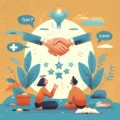Understanding Difficult People
We all encounter difficult people in our lives from time to time. Though challenging, these relationships present opportunities for growth if we approach them with compassion.
Why are some people difficult?
There are many reasons why someone might seem difficult:
- They may be struggling with personal issues that affect their behavior
- They may have different communication styles or values
- Past negative experiences can shape how they interact
Rather than judge, we can reflect on how a difficult person’s life experiences may be shaping their actions.
Responding with compassion
Here are some tips for engaging with difficult people:
- Lead with empathy – Try to understand their perspective
- Set kind boundaries if needed – Know your limits
- Don’t take it personally – Their reactions likely aren’t about you
Meeting negativity with compassion often shifts the tone of interactions in a positive direction.
Focusing on personal growth
Difficult relationships also present opportunities to grow:
- Practice forgiveness
- Improve communication abilities – Listen actively and speak thoughtfully
- Learn not to react emotionally – Stay grounded in difficult moments
With self-work, we can become better friends, partners, and community members.
FAQs
What causes someone to be difficult?
Many factors lead to difficult behaviors – personal struggles, poor communication, negative experiences. With empathy, we can understand what may be shaping their actions.
How should you react to a difficult person?
Lead with compassion rather than judgment or criticism. Set kind boundaries when needed. Avoid taking their reactions personally.
What is the benefit of engaging with difficult people?
These challenging relationships provide opportunities for personal growth if we approach them with patience and care – practicing forgiveness, improving communication, releasing emotional reactions.
What are some tips for dealing with difficult people?
Empathize and try to understand their perspective instead of judging. Establish kind boundaries if needed. Reframe reactions as not being about you. Meet negativity with compassion.
How can difficult people relationships help us grow?
By practicing forgiveness, deepening listening and communication abilities, and learning not to react emotionally, difficult relationships can help us become better friends, partners and community members.









